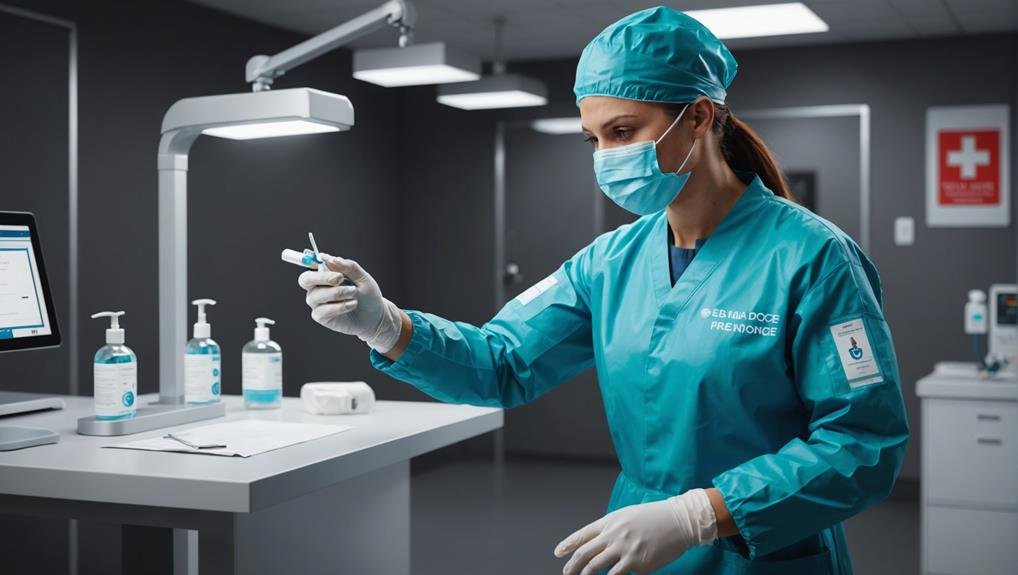Infection Prevention Strategies Unveiled
Reveal effective infection prevention strategies by understanding how pathogens spread through respiratory droplets, surfaces, and bodily fluids. Implement preventive measures like regular handwashing for 20 seconds, covering sneezes, and practicing good hygiene habits. Utilize food safety techniques such as proper raw food handling and avoiding cross-contamination to reduce infection risks. Stay up-to-date on vaccinations to protect against serious illnesses and contribute to community immunity. Manage pest control to prevent insect-borne diseases and implement strategies like using EPA-approved repellents and limiting outdoor activities during peak mosquito times. Safeguard your health with these proactive infection prevention methods.
Key Takeaways
- Practice good hygiene to reduce infection transmission risks.
- Implement food safety techniques to prevent foodborne illnesses.
- Ensure up-to-date vaccinations for community immunity.
- Employ bug bite prevention methods to avoid insect-borne diseases.
- Control animal populations to minimize disease spread.
Understanding Infection Transmission
Understanding how pathogens spread from person to person is crucial in developing effective infection prevention strategies. The immune system plays a critical role in fighting off invading pathogens.
Pathogens can move through various routes such as respiratory droplets, contaminated surfaces, or bodily fluids. Once inside the body, they can evade the immune system's defenses and cause infections. Recognizing the mechanisms of pathogen movement helps in implementing targeted preventive measures.
Practicing Good Hygiene
To effectively prevent infections, practicing good hygiene habits is vital in reducing the spread of germs and protecting overall health. Proper handwashing techniques are essential in eliminating harmful pathogens. Make sure you wash your hands with soap and water for at least 20 seconds, covering all surfaces, including the backs of your hands and under your nails. Additionally, maintaining personal hygiene habits like covering your mouth and nose when sneezing or coughing, and avoiding sharing personal items, can greatly decrease the risk of infection transmission. By following these simple yet impactful practices, you can create a barrier against germs and contribute to a healthier environment for yourself and those around you.
| Handwashing Techniques | Personal Hygiene Habits |
|---|---|
| Wash hands for 20 seconds | Cover mouth when sneezing/coughing |
| Use soap and water | Avoid sharing personal items |
| Cover all surfaces | Maintain cleanliness |
Food Safety Techniques
When practicing food safety techniques, make sure that you rinse and separate raw foods properly to prevent food-borne infections. Important handling of raw foods is essential to avoid cross-contamination.
Be diligent in washing fruits and vegetables under running water to remove dirt and bacteria. Additionally, keep raw meats separate from ready-to-eat foods in your grocery cart, refrigerator, and during meal preparation.
Cooking methods play a vital role in killing harmful bacteria; make sure that meats reach the correct internal temperature. Use a food thermometer to check if food is cooked thoroughly.
Importance of Vaccinations
Ensuring you keep current vaccinations is essential for protecting yourself and others from serious infections. Vaccine effectiveness is a vital factor in preventing the spread of diseases. By staying up to date with immunizations, you not only safeguard your health but also contribute to community immunity, protecting those who can't be vaccinated.
Vaccines offer a range of immunization benefits, from reducing the risk of contracting illnesses to decreasing the severity of symptoms if you do get sick. Consulting healthcare providers for guidance on necessary vaccinations, especially before international travel, is key.
Bug Bites and Animal Control
Implement proactive measures to safeguard against bug bites and maintain effective animal control for disease prevention. Pest management is essential in preventing insect-borne diseases.
Use EPA-approved insect repellents containing DEET or picaridin to ward off mosquitoes and ticks. Limit outdoor activities during dawn and dusk when mosquitoes are most active. Drain standing water to eliminate mosquito breeding grounds. In tick-prone areas, wear long sleeves, pants, and use insect repellent with permethrin. After outdoor activities, thoroughly check for ticks, especially in hidden areas.
Wildlife encounters can also pose risks. Implement animal control measures to deter rodents and prevent diseases like rabies transmission. Seal entry points, store food securely, and keep trash bins tightly sealed to avoid attracting wildlife.
Vigilance in pest management and wildlife control is key to infection prevention.
Conclusion
As you navigate the labyrinth of health and wellness, remember that knowledge is your shield against the unseen adversaries lurking in the shadows.
Just as a vigilant sentinel protects a castle from invaders, so too can your understanding of infection prevention safeguard your body from harm.
Stay vigilant, stay informed, and fortify your defenses with the powerful arsenal of preventive strategies.
Together, we can conquer the battleground of infections and pave the way to a healthier, safer future.







